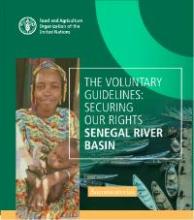/ library resources
Showing items 1 through 9 of 46.Access to land is highly dependent on social status (ethnicity, social class) and family status (position in the household) of individuals. Women's access to land varies according to eco-geographical zones and as well, is dependent on their particular position and rank in the family household.
The support plan for the Sahel is a regional approach to collectively address the root causes of disruptions such as poverty, migration and youth unemployment, climate change, insecurity, governance and institutional issues in the region.
‘Over the past three decades hundreds of thousands of farmers in Burkina Faso and Niger, on the fringes of the Sahara Desert, have transformed large swathes of the region’s arid landscape into productive agricultural land, improving food security for about three million people.
In the above initiatives, self-motivated populations increased food security and reduced vulnerabilities to climatic shocks by restoring and sustainably managing local forest resources.
The climate-smart village approach created enthusiasm and commitment from farmers in seeking solutions to the problems and constraints that they themselves identified.
This publication will demonstrate how the project was a catalyst leading to improvements in conditions in the Senegal River Basin, under which land is held or occupied in agriculture sectors.
This article provides a description of baseline survey data that was collected in Senegal in the regions of Sedhiou and Tambacounda in 2020, respectively, and as part of an agricultural development project aimed at improving the well-being and resilience of farming households.
Pagination
Land Library Search
Through our robust search engine, you can search for any item of the over 73,000 highly curated resources in the Land Library.
If you would like to find an overview of what is possible, feel free to peruse the Search Guide.






